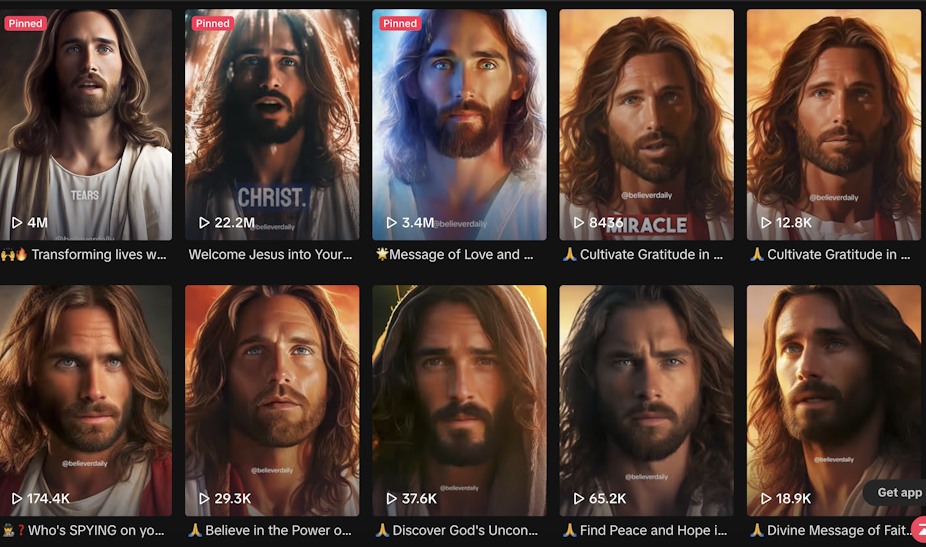The TikTok profile Daily Believer (@believerdaily) has 70 videos with computer-generated Jesuses looking directly at the viewer, beseeching them to stop scrolling and watch the next minute’s worth of content.
All these Jesuses are long-haired and bearded, recalling artist Warner Sallman’s ubiquitous 1940 painting “Head of Christ.” Some wear the crown of thorns, some look alarmingly like the actor Jared Leto. Nearly all promise a surprise or “good news soon” in exchange for the viewer liking, commenting “Amen” or sharing it with their friends and family. With this digital outreach, the Daily Believer has gained, as of Nov. 13, 2023, 813,200 followers and over 9.2 million likes.
As a scholar of religion in the U.S. and its intersection with popular culture, I have been studying the ways American Christians use media and popular culture to perform religious work and evangelical outreach for the past 13 years. I argue that this TikTok phenomenon, in which viewers are promised good luck for sharing, liking and commenting on videos of a computer-generated Jesus, is close to what is known as the prosperity gospel – that is, a Christian belief that God will reward faith with this-worldly comforts, like health and wealth.
Computer-generated Jesus
“Welcome Jesus into Your Home” is among the Daily Believer’s most popular videos, with over 22.2 million subscribers. According to the computer-generated Jesus, if the viewer believes in God, they must share this video with their friends and family and comment “I believe.”
If they do, they will receive a blessing within an hour. If they do not, computer-generated Jesus issues a thinly veiled threat of damnation by quoting Matthew 3:10, which has John the Baptist saying, “Even now the ax is lying at the root of the trees; every tree therefore that does not bear good fruit is cut down and thrown into the fire.”
It is a TikTok chain letter – one whose creator can be monetarily compensated, by TikTok, between 2 cents and 4 cents for every 1,000 views. For example, “Welcome Jesus into Your Home” could have earned the creator $900 from TikTok views alone, with the possibility for additional money earned on sites like Facebook Reels.
It is simple and effective. While the Daily Believer’s views are dwarfed by TikTok megastars like socialite Kylie Jenner and social media personality Khaby Lame, its engagement percentages are much higher, receiving some form of engagement from about one out of every four viewers.
Whether or not there are religious motivations underlying the Daily Believer’s desire for viewer engagement, there are monetary benefits for sure. The TikTok Creator Fund pays creators who have over 10,000 authentic followers based on the number of views, comments and sharing.
Faith equals wealth and health

Religious and monetary motivations are not mutually exclusive. In fact, their union is key to one of the more popular recent developments in American and global Christianity – the prosperity gospel, a subsection of Charismatic Christianity that says God will ensure followers’ material wealth and happiness as long as they believe in God.
The closest nonreligious analogy to the Daily Believer’s content is the chain letter where the recipient is promised good luck for forwarding and curses for breaking the chain. Such letters had their heyday in the mid-20th century as paper letters and in the late 1990s and early 2000s as emails and social media posts.
Two of the United States’ most famous preachers, T.D. Jakes and Joel Osteen, teach that individual faith in God will be rewarded by God in the form of material wealth and health.
However, the Daily Believer further simplifies this formula. Viewers don’t really need to have a specific set of Christian beliefs to participate and benefit. All that they need to do is to say “I believe” and share the content with friends and family.
Turning likes and shares into cash
This lack of denominational-specific beliefs allows for the widest possible engagement with a wider Christian community.
The TikTok videos can appeal to a spectrum of Christian groups that may have theological, ethical and social disagreements.
Additionally, the Daily Believer’s requests for social media engagement is analogous to the prosperity gospel’s idea of tithing. In the prosperity gospel, tithing – the donation of a portion of your income to the church – is framed as “seed faith,” a monetary investment to demonstrate a person’s faith, and lack of faith will be punished as surely as faith is to be rewarded.
Seed faith and engagement with the Daily Believer’s TikTok videos have the same ritualistic function – give a little time, money or effort to get even more material rewards. They also both serve to make the person behind the request wealthier or increase their cultural clout.

By framing these requests as coming directly from the Son of God, not the influencer or content creator, the Daily Believer has made engagement with its social media religious work, which comes with a promise of divine reward in the here and now. It has transformed like-farming – the social media phenomenon of asking for viewer engagement – into the word of God.
Use of Jesus’ image
At the same time, it is difficult to see the Daily Believer’s content as having a missionary or outreach function. It seems aimed at those who would already consider themselves Christian and offers little in the way of persuasion or explanation of why someone should be a Christian.
The Daily Believer is not the only TikTok profile engaged in a type of “smash that like button if you love Jesus” content production. Within the larger phenomena of #ChristianTikTok, there are multiple profiles engaged in theological discussion and doctrinal issues. There are even more profiles that forgo discussion in favor of performing praise and worship.
The use of Jesus’ image as the deliverer of the message is more unique.
But the Daily Believer, with its digital Jesus and its bare-bones gospel of “Believe,” serves as an example of a new expression of an ancient religious motivation – the securing of this-worldly health, wealth and reward in exchange for following the will of the deity or deities.

